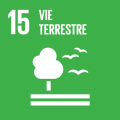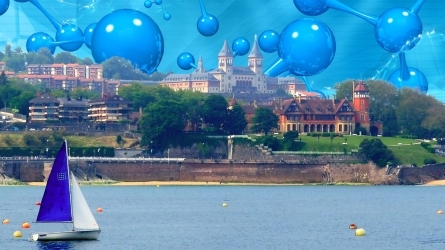
TopaGune - Del desarrollo sostenible a la economía circular: situación actual y retos a futuro
Description
This Summer Course will be face to face. But it can also be followed in live online classroom format and you will be able to participate virtually from anywhere. You can access the file of the live online course by clicking on LIVE ONLINE.
In 2015, the European Commission adopted a series of comprehensive measures in pursuit of a circular economy called the Circular Economy Action Plan, which included measures that would help stimulate Europe's transition to a more sustainable economy, boost global competitiveness, foster economic growth and generate new jobs.
A concrete and ambitious action program was established in the EU Action Plan for the circular economy, with measures covering the entire economic cycle: from production and consumption to waste management and the secondary raw materials market and a revised legislative proposal on waste. The proposed actions were aimed at "closing the cycle" of product life cycles through increased recycling and reuse, providing benefits for both the environment and the economy.
The revised legislative framework on waste entered into force in July 2018, where clear objectives for waste reduction have been established, and establishes an ambitious and credible long-term path for its management and recycling. Key elements of the revised waste proposal include, among others, recycling 65% of municipal waste by 2035; recycle 70% of packaging waste by 2030; as well as objectives for specific packaging materials such as paper and cardboard: 85%, ferrous metals: 80%, plastic: 55% and wood: 30%.
Objectives
Present the advances that are being made in the field of circular economy combining different perspectives; the academic, business and public administration.
Raise awareness about other business management models and organizations aligned with the principles of sustainable development and the circular economy.
Provide tools to the participants for the introduction of the circular economy in organizational processes.
Contribute to the technical-economic knowledge for the implementation of the circular economy in companies and introduce the principles of the circular model in the activity of management and measurement, environmental accounting and sustainability reporting.
Promote a participatory dynamic on the part of the students, which allows consensus to be reached in the elaboration of a conceptual map of circular economy taking into account the different perspectives derived from the personal, training and professional characteristics of the participants.
Activity directed to
- All public
Program
14-09-2020
Registro
Presentation by the Director of the activity
- José M. Moneva Abadía | (Este ponente intervendrá vía Zoom) Universidad de Zaragoza - Catedrático
“Construyendo un mapa de indicadores para la evaluación de la Economía Circular bajo una perspectiva internacional“
- Igor Álvarez Etxeberria | UPV/EHU - Acreditado a Pleno (Catedrático laboral)
Break
“Estrategias Circulares en los sistemas de producción y medición en el ciclo de vida“
- Sabina Scarpellini | Universidad de Zaragoza - Profesora Titular
“Impulso a la economía circular desde la administración pública“
- José Ignacio Asensio Bazterra | Gipuzkoako Foru Aldundia / Diputación Foral de Gipuzkoa - Diputado Foral de Medio Ambiente y Obras Hidráulicas
Closing session
- Igor Álvarez Etxeberria | UPV/EHU - Acreditado a Pleno (Catedrático laboral)
15-09-2020
Construyendo un marco conceptual de la economía circular mediante dinámica participativa
Directors

José M. Moneva Abadía
Universidad de Zaragoza
Jose M. Moneva is a professor at the University of Zaragoza and Dean of the Faculty of Economics and Business. He has been director of the BSH Electrodomésticos Chair in Innovation and coordinator of the CSR committee of AECA, the Spanish business accounting and administration association. He has also been a member of the Global Reporting Initiative (GRI) working party in its 2002 version and of the Management Committee of the European Sustainability Reporting Association (ESRA). He is currently part of the Spanish circular economy observatory. His main lines of research are related to social and environmental accounting, sustainable finance, sustainability and corporate social responsibility information and the circular economy.
Speakers

Igor Álvarez Etxeberria
UPV/EHU
Igor Alvarez Etxeberria is associated professor (full professor accredited) of accounting at the University of Basque Country. He also member of the Steering Committee of EMAN Europe. His interests are the role of business in sustainable development, social and environmental reporting, carbon accounting, Biodiversity accounting and CSR performance. He has published in a number of journals that include Accounting, Business Strategy and Environment, CSR and Environmental management, Ecological Economics, Journal of Cleaner Production, Sustainable Development, Supply Chain management and International Journal, Spanish Accounting Review and Spanish Journal of Finance and Accounting.

José Ignacio Asensio Bazterra
Diputación Foral de Gipuzkoa
Deputy of the Environment and Water Engineering

Sabina Scarpellini
Universidad de Zaragoza
Dr Sabina Scarpellini is an associate professor at the Department of Accounting and Finance of the University of Zaragoza, and she is PhD in Accounting and Finance (University of Zaragoza). She holds an MSc degree in Management of Organizations and a second PhD degree in renewable energy and energy efficiency. With a broad previous professional experience in private R&D Institutes, Dr Scarpellini has led and has participated in R&D projects. She is the author of many international scientific papers and books and is a member of different national and international technology platforms and committees.
Registration fees
| REGISTRATION | Until 01-06-2020 | Until 14-09-2020 |
|---|---|---|
| 0 EUR | - | |
| - | 77,00 EUR | |
| - | 65,00 EUR | |
| - | 20,00 EUR |
Venue
Miramar Palace
Pº de Miraconcha nº 48. Donostia / San Sebastián
Gipuzkoa
Miramar Palace
Pº de Miraconcha nº 48. Donostia / San Sebastián
Gipuzkoa
Sustainable development goals
Agenda 2030 is the new international development agenda approved in September 2015 by the United Nations. This agenda aims to be an instrument to favour sustainable human development all over the planet, and its main pillars are the eradication of poverty, a reduction in equality and vulnerability and fostering sustainability. It is a unique opportunity to transform the world up to 2030 and guarantee human rights for all.

3 - Good health and well-being
Guarantee a healthy life and foster the well-being of all people of all ages. Key issues: universal healthcare coverage, sexual and reproductive health, reduction in the number of road accident casualties, pollution and chemical products, reduction in maternal and neonatal mortality, the end of epidemics such as AIDS, combating hepatitis and other water-borne diseases, drug and alcohol prevention, control of tobacco.
More information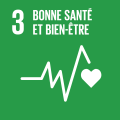
7 - Affordable and clean energy
Guaranteeing access to affordable, reliable, sustainable and modern energy for everyone. Key issues: universal access, increased proportion of clean energies, energy efficiency, research, fostering investments in energy infrastructures and clean technologies, modern and sustainable energy services.
More information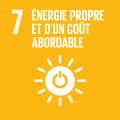
9 - Industry, innovation and infrastructure
Build resilient infrastructures, promote inclusive and sustainable industrialisation and foster innovation. Key issues: reliable, sustainable, resilient and quality infrastructures, inclusive and sustainable industrialisation, modernisation, clean and environmentally rational industrial technologies and processes, scientific research and improvement of technological capabilities, universal access to ICTs.
More information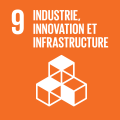
12 - Responsible consumption and production
Guarantee sustainable modalities of consumption and production. Key issues: sustainable management and efficient use of natural resources, reduction of chemical particles released to the atmosphere, water and soils, reduction of waste products, recycling, reuse and reduction, sustainable practices, sustainable public procurement, sustainable lifestyles, rationalisation of inefficient subsidies for fossil fuels.
More information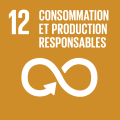
13 - Climate action
Adopt urgent measures to combat climate change and its effects. Key issues: mitigation, resilience and capacity for adaptation, planning, national strategies and plans, education and raising awareness, reduction of effects and early warning systems, compliance with the Framework Convention of the United Nations on Climate Change.
More information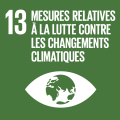
14 - Life below water
Conserve and sustainably use the oceans, seas and marine resources for sustainable development. Key issues: reduction of marine pollution and acidification of the oceans, protection of marine ecosystems, re-establishment of the health and productivity of the oceans, conservation de coastal and marine areas, elimination of over-fishing and poaching, support for traditional fishing, increased scientific knowledge.
More information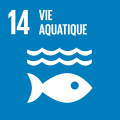
15 - Life on land
Protect, establish and foster the sustainable use of terrestrial ecosystems, manage forests sustainably, fight desertification, hold back and reverse the degradation of land and delay the loss of biodiversity. Key issues: the fight against desertification, reforestation, conservation, the regeneration and sustainable use of terrestrial ecosystems, natural habitats, biodiversity, invasive exotic species, integration of the values of ecosystems into planning, poaching.
More information